Analyzing Mental Health Recovery Principles Using Sandy Jeffs' Poetry
VerifiedAdded on 2023/06/14
|10
|2504
|342
Essay
AI Summary
This essay analyzes the principles of recovery-oriented mental health practice through the lens of Sandy Jeffs' poetry, highlighting the importance of individual uniqueness, real choice, attitudes and rights, dignity and respect, partnership and collaboration, and evaluation. It emphasizes how Jeffs' lived experiences offer valuable insights for healthcare professionals to align their practices with national frameworks for mental health services. The paper discusses how practitioners can understand the challenges faced by mentally ill patients by examining Jeffs' work, advocating for a shift towards patient involvement, respect, and the recognition of individual strengths in the recovery process. The essay also touches on the need for community support, addressing stigma, and providing meaningful employment opportunities for individuals with mental illness, reinforcing the idea that recovery is a deeply personal journey that requires a holistic and patient-centered approach. This student contributed document is available on Desklib, a platform offering AI-powered study tools for students.
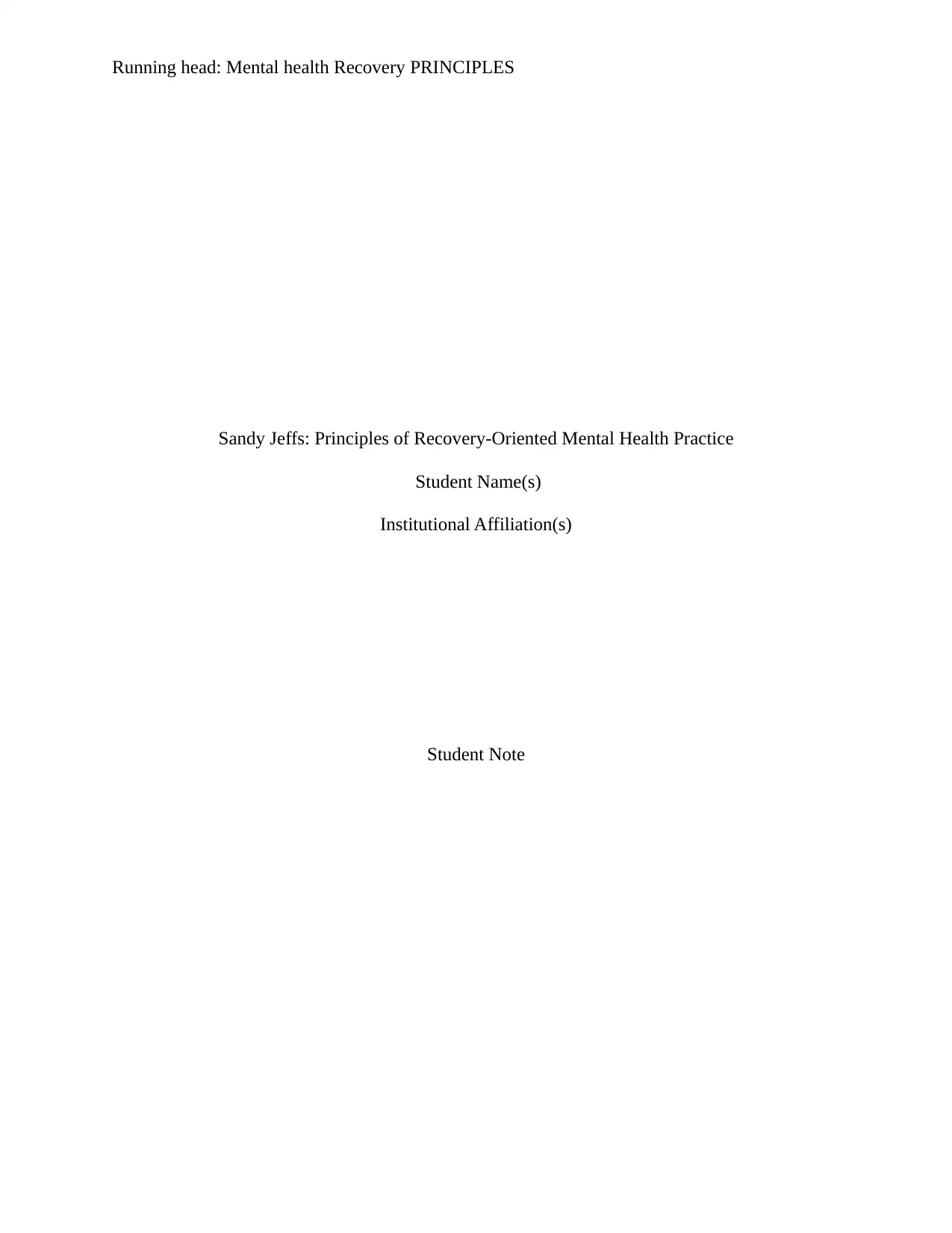
Running head: Mental health Recovery PRINCIPLES
Sandy Jeffs: Principles of Recovery-Oriented Mental Health Practice
Student Name(s)
Institutional Affiliation(s)
Student Note
Sandy Jeffs: Principles of Recovery-Oriented Mental Health Practice
Student Name(s)
Institutional Affiliation(s)
Student Note
Paraphrase This Document
Need a fresh take? Get an instant paraphrase of this document with our AI Paraphraser
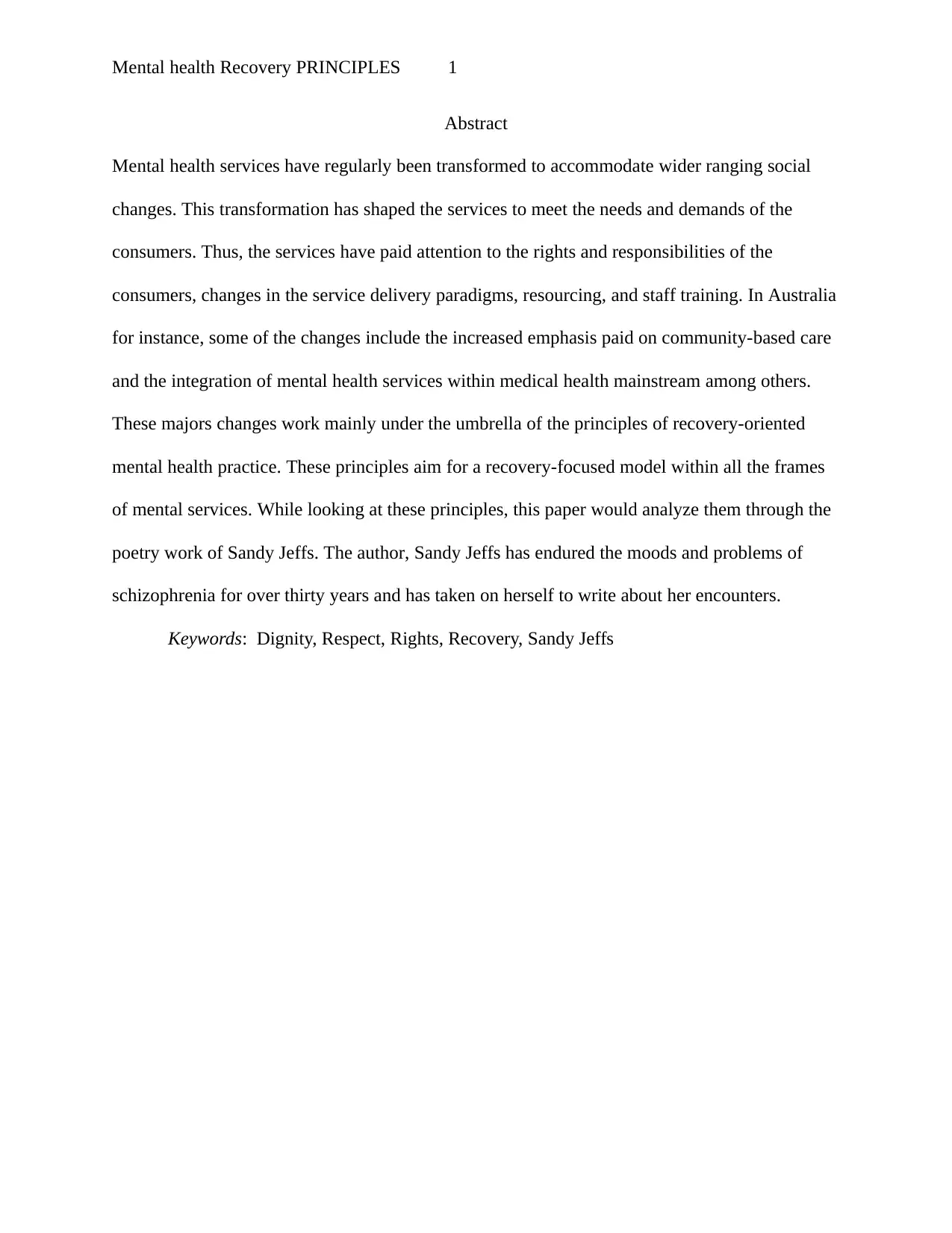
Mental health Recovery PRINCIPLES 1
Abstract
Mental health services have regularly been transformed to accommodate wider ranging social
changes. This transformation has shaped the services to meet the needs and demands of the
consumers. Thus, the services have paid attention to the rights and responsibilities of the
consumers, changes in the service delivery paradigms, resourcing, and staff training. In Australia
for instance, some of the changes include the increased emphasis paid on community-based care
and the integration of mental health services within medical health mainstream among others.
These majors changes work mainly under the umbrella of the principles of recovery-oriented
mental health practice. These principles aim for a recovery-focused model within all the frames
of mental services. While looking at these principles, this paper would analyze them through the
poetry work of Sandy Jeffs. The author, Sandy Jeffs has endured the moods and problems of
schizophrenia for over thirty years and has taken on herself to write about her encounters.
Keywords: Dignity, Respect, Rights, Recovery, Sandy Jeffs
Abstract
Mental health services have regularly been transformed to accommodate wider ranging social
changes. This transformation has shaped the services to meet the needs and demands of the
consumers. Thus, the services have paid attention to the rights and responsibilities of the
consumers, changes in the service delivery paradigms, resourcing, and staff training. In Australia
for instance, some of the changes include the increased emphasis paid on community-based care
and the integration of mental health services within medical health mainstream among others.
These majors changes work mainly under the umbrella of the principles of recovery-oriented
mental health practice. These principles aim for a recovery-focused model within all the frames
of mental services. While looking at these principles, this paper would analyze them through the
poetry work of Sandy Jeffs. The author, Sandy Jeffs has endured the moods and problems of
schizophrenia for over thirty years and has taken on herself to write about her encounters.
Keywords: Dignity, Respect, Rights, Recovery, Sandy Jeffs
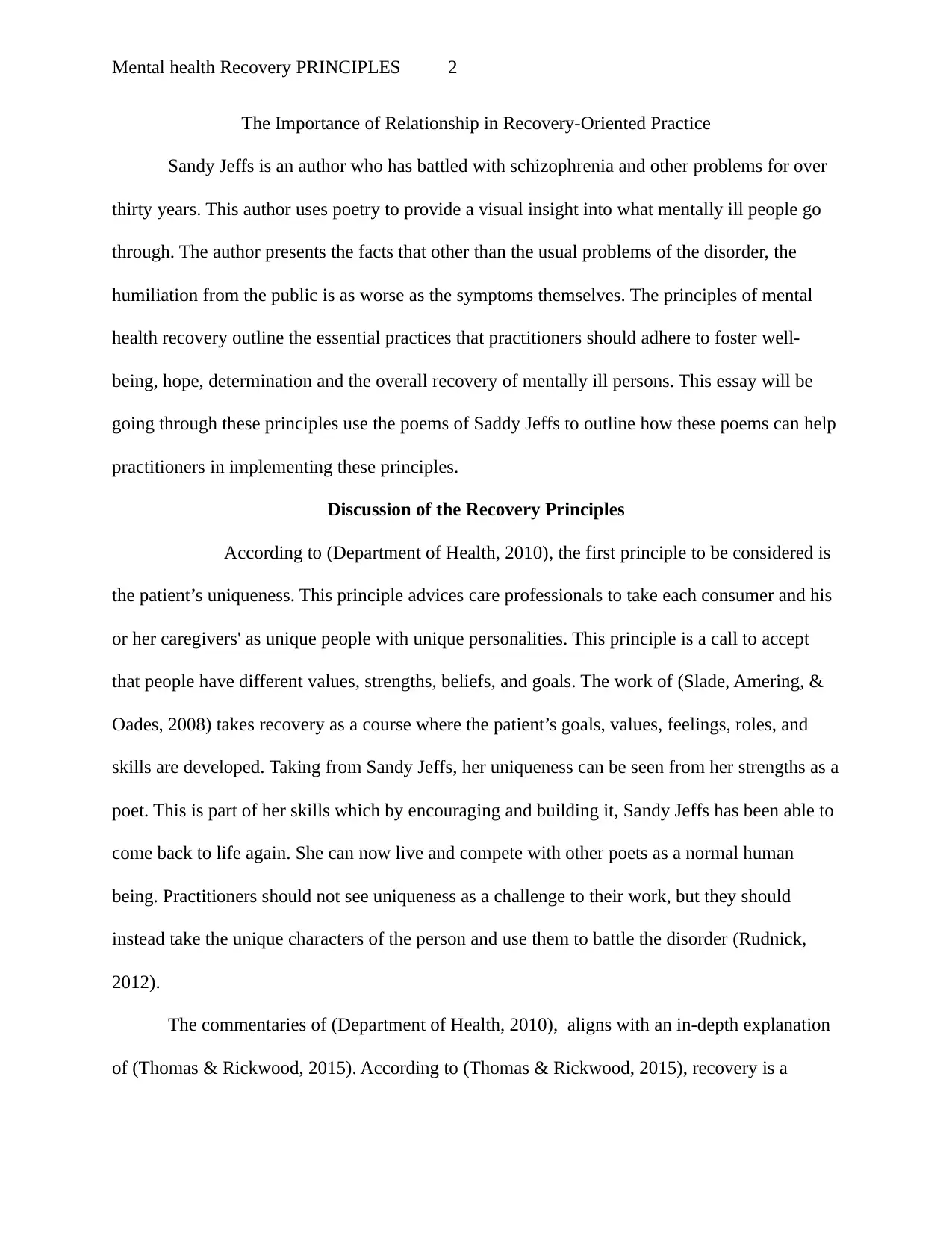
Mental health Recovery PRINCIPLES 2
The Importance of Relationship in Recovery-Oriented Practice
Sandy Jeffs is an author who has battled with schizophrenia and other problems for over
thirty years. This author uses poetry to provide a visual insight into what mentally ill people go
through. The author presents the facts that other than the usual problems of the disorder, the
humiliation from the public is as worse as the symptoms themselves. The principles of mental
health recovery outline the essential practices that practitioners should adhere to foster well-
being, hope, determination and the overall recovery of mentally ill persons. This essay will be
going through these principles use the poems of Saddy Jeffs to outline how these poems can help
practitioners in implementing these principles.
Discussion of the Recovery Principles
According to (Department of Health, 2010), the first principle to be considered is
the patient’s uniqueness. This principle advices care professionals to take each consumer and his
or her caregivers' as unique people with unique personalities. This principle is a call to accept
that people have different values, strengths, beliefs, and goals. The work of (Slade, Amering, &
Oades, 2008) takes recovery as a course where the patient’s goals, values, feelings, roles, and
skills are developed. Taking from Sandy Jeffs, her uniqueness can be seen from her strengths as a
poet. This is part of her skills which by encouraging and building it, Sandy Jeffs has been able to
come back to life again. She can now live and compete with other poets as a normal human
being. Practitioners should not see uniqueness as a challenge to their work, but they should
instead take the unique characters of the person and use them to battle the disorder (Rudnick,
2012).
The commentaries of (Department of Health, 2010), aligns with an in-depth explanation
of (Thomas & Rickwood, 2015). According to (Thomas & Rickwood, 2015), recovery is a
The Importance of Relationship in Recovery-Oriented Practice
Sandy Jeffs is an author who has battled with schizophrenia and other problems for over
thirty years. This author uses poetry to provide a visual insight into what mentally ill people go
through. The author presents the facts that other than the usual problems of the disorder, the
humiliation from the public is as worse as the symptoms themselves. The principles of mental
health recovery outline the essential practices that practitioners should adhere to foster well-
being, hope, determination and the overall recovery of mentally ill persons. This essay will be
going through these principles use the poems of Saddy Jeffs to outline how these poems can help
practitioners in implementing these principles.
Discussion of the Recovery Principles
According to (Department of Health, 2010), the first principle to be considered is
the patient’s uniqueness. This principle advices care professionals to take each consumer and his
or her caregivers' as unique people with unique personalities. This principle is a call to accept
that people have different values, strengths, beliefs, and goals. The work of (Slade, Amering, &
Oades, 2008) takes recovery as a course where the patient’s goals, values, feelings, roles, and
skills are developed. Taking from Sandy Jeffs, her uniqueness can be seen from her strengths as a
poet. This is part of her skills which by encouraging and building it, Sandy Jeffs has been able to
come back to life again. She can now live and compete with other poets as a normal human
being. Practitioners should not see uniqueness as a challenge to their work, but they should
instead take the unique characters of the person and use them to battle the disorder (Rudnick,
2012).
The commentaries of (Department of Health, 2010), aligns with an in-depth explanation
of (Thomas & Rickwood, 2015). According to (Thomas & Rickwood, 2015), recovery is a
⊘ This is a preview!⊘
Do you want full access?
Subscribe today to unlock all pages.

Trusted by 1+ million students worldwide
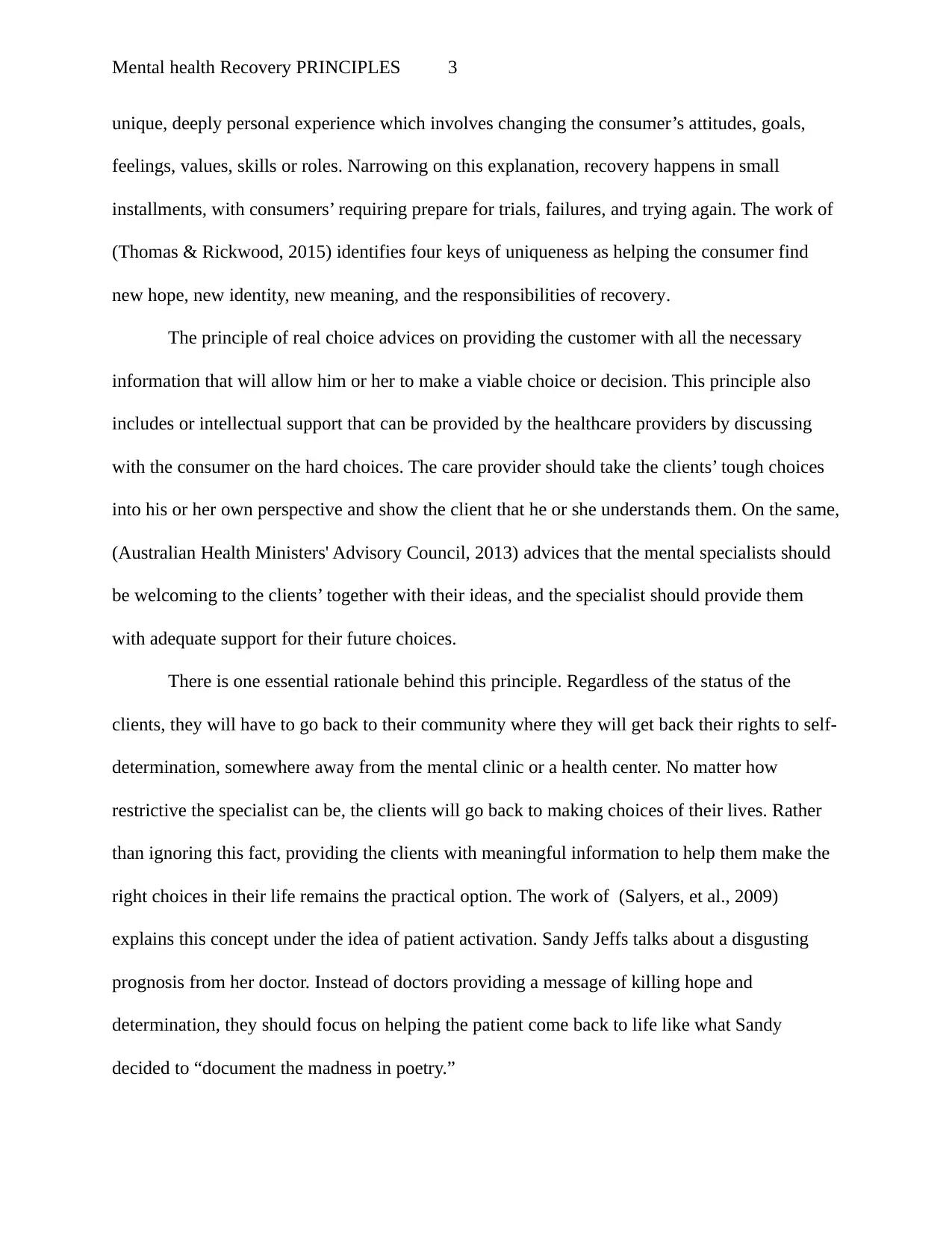
Mental health Recovery PRINCIPLES 3
unique, deeply personal experience which involves changing the consumer’s attitudes, goals,
feelings, values, skills or roles. Narrowing on this explanation, recovery happens in small
installments, with consumers’ requiring prepare for trials, failures, and trying again. The work of
(Thomas & Rickwood, 2015) identifies four keys of uniqueness as helping the consumer find
new hope, new identity, new meaning, and the responsibilities of recovery.
The principle of real choice advices on providing the customer with all the necessary
information that will allow him or her to make a viable choice or decision. This principle also
includes or intellectual support that can be provided by the healthcare providers by discussing
with the consumer on the hard choices. The care provider should take the clients’ tough choices
into his or her own perspective and show the client that he or she understands them. On the same,
(Australian Health Ministers' Advisory Council, 2013) advices that the mental specialists should
be welcoming to the clients’ together with their ideas, and the specialist should provide them
with adequate support for their future choices.
There is one essential rationale behind this principle. Regardless of the status of the
clients, they will have to go back to their community where they will get back their rights to self-
determination, somewhere away from the mental clinic or a health center. No matter how
restrictive the specialist can be, the clients will go back to making choices of their lives. Rather
than ignoring this fact, providing the clients with meaningful information to help them make the
right choices in their life remains the practical option. The work of (Salyers, et al., 2009)
explains this concept under the idea of patient activation. Sandy Jeffs talks about a disgusting
prognosis from her doctor. Instead of doctors providing a message of killing hope and
determination, they should focus on helping the patient come back to life like what Sandy
decided to “document the madness in poetry.”
unique, deeply personal experience which involves changing the consumer’s attitudes, goals,
feelings, values, skills or roles. Narrowing on this explanation, recovery happens in small
installments, with consumers’ requiring prepare for trials, failures, and trying again. The work of
(Thomas & Rickwood, 2015) identifies four keys of uniqueness as helping the consumer find
new hope, new identity, new meaning, and the responsibilities of recovery.
The principle of real choice advices on providing the customer with all the necessary
information that will allow him or her to make a viable choice or decision. This principle also
includes or intellectual support that can be provided by the healthcare providers by discussing
with the consumer on the hard choices. The care provider should take the clients’ tough choices
into his or her own perspective and show the client that he or she understands them. On the same,
(Australian Health Ministers' Advisory Council, 2013) advices that the mental specialists should
be welcoming to the clients’ together with their ideas, and the specialist should provide them
with adequate support for their future choices.
There is one essential rationale behind this principle. Regardless of the status of the
clients, they will have to go back to their community where they will get back their rights to self-
determination, somewhere away from the mental clinic or a health center. No matter how
restrictive the specialist can be, the clients will go back to making choices of their lives. Rather
than ignoring this fact, providing the clients with meaningful information to help them make the
right choices in their life remains the practical option. The work of (Salyers, et al., 2009)
explains this concept under the idea of patient activation. Sandy Jeffs talks about a disgusting
prognosis from her doctor. Instead of doctors providing a message of killing hope and
determination, they should focus on helping the patient come back to life like what Sandy
decided to “document the madness in poetry.”
Paraphrase This Document
Need a fresh take? Get an instant paraphrase of this document with our AI Paraphraser
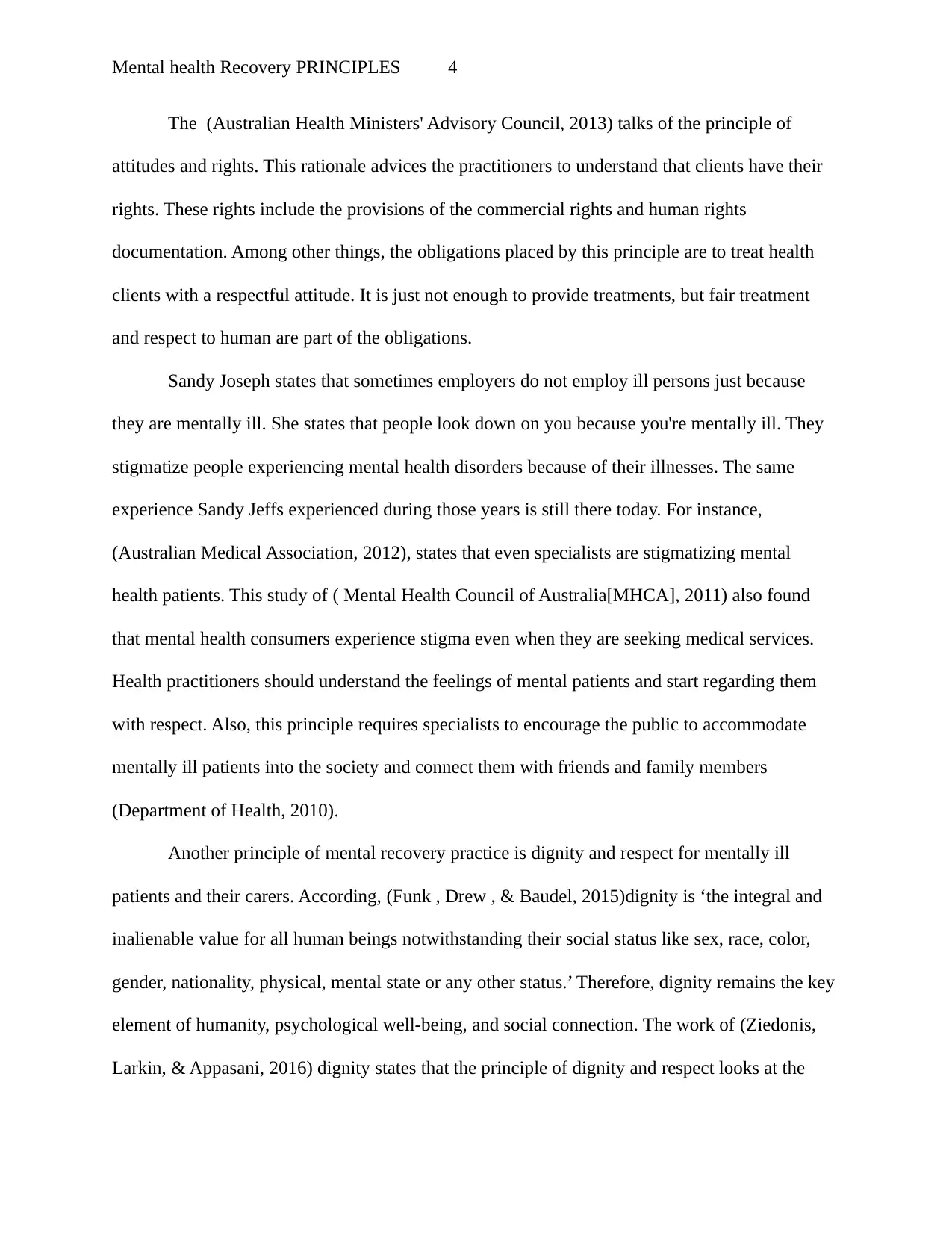
Mental health Recovery PRINCIPLES 4
The (Australian Health Ministers' Advisory Council, 2013) talks of the principle of
attitudes and rights. This rationale advices the practitioners to understand that clients have their
rights. These rights include the provisions of the commercial rights and human rights
documentation. Among other things, the obligations placed by this principle are to treat health
clients with a respectful attitude. It is just not enough to provide treatments, but fair treatment
and respect to human are part of the obligations.
Sandy Joseph states that sometimes employers do not employ ill persons just because
they are mentally ill. She states that people look down on you because you're mentally ill. They
stigmatize people experiencing mental health disorders because of their illnesses. The same
experience Sandy Jeffs experienced during those years is still there today. For instance,
(Australian Medical Association, 2012), states that even specialists are stigmatizing mental
health patients. This study of ( Mental Health Council of Australia[MHCA], 2011) also found
that mental health consumers experience stigma even when they are seeking medical services.
Health practitioners should understand the feelings of mental patients and start regarding them
with respect. Also, this principle requires specialists to encourage the public to accommodate
mentally ill patients into the society and connect them with friends and family members
(Department of Health, 2010).
Another principle of mental recovery practice is dignity and respect for mentally ill
patients and their carers. According, (Funk , Drew , & Baudel, 2015)dignity is ‘the integral and
inalienable value for all human beings notwithstanding their social status like sex, race, color,
gender, nationality, physical, mental state or any other status.’ Therefore, dignity remains the key
element of humanity, psychological well-being, and social connection. The work of (Ziedonis,
Larkin, & Appasani, 2016) dignity states that the principle of dignity and respect looks at the
The (Australian Health Ministers' Advisory Council, 2013) talks of the principle of
attitudes and rights. This rationale advices the practitioners to understand that clients have their
rights. These rights include the provisions of the commercial rights and human rights
documentation. Among other things, the obligations placed by this principle are to treat health
clients with a respectful attitude. It is just not enough to provide treatments, but fair treatment
and respect to human are part of the obligations.
Sandy Joseph states that sometimes employers do not employ ill persons just because
they are mentally ill. She states that people look down on you because you're mentally ill. They
stigmatize people experiencing mental health disorders because of their illnesses. The same
experience Sandy Jeffs experienced during those years is still there today. For instance,
(Australian Medical Association, 2012), states that even specialists are stigmatizing mental
health patients. This study of ( Mental Health Council of Australia[MHCA], 2011) also found
that mental health consumers experience stigma even when they are seeking medical services.
Health practitioners should understand the feelings of mental patients and start regarding them
with respect. Also, this principle requires specialists to encourage the public to accommodate
mentally ill patients into the society and connect them with friends and family members
(Department of Health, 2010).
Another principle of mental recovery practice is dignity and respect for mentally ill
patients and their carers. According, (Funk , Drew , & Baudel, 2015)dignity is ‘the integral and
inalienable value for all human beings notwithstanding their social status like sex, race, color,
gender, nationality, physical, mental state or any other status.’ Therefore, dignity remains the key
element of humanity, psychological well-being, and social connection. The work of (Ziedonis,
Larkin, & Appasani, 2016) dignity states that the principle of dignity and respect looks at the
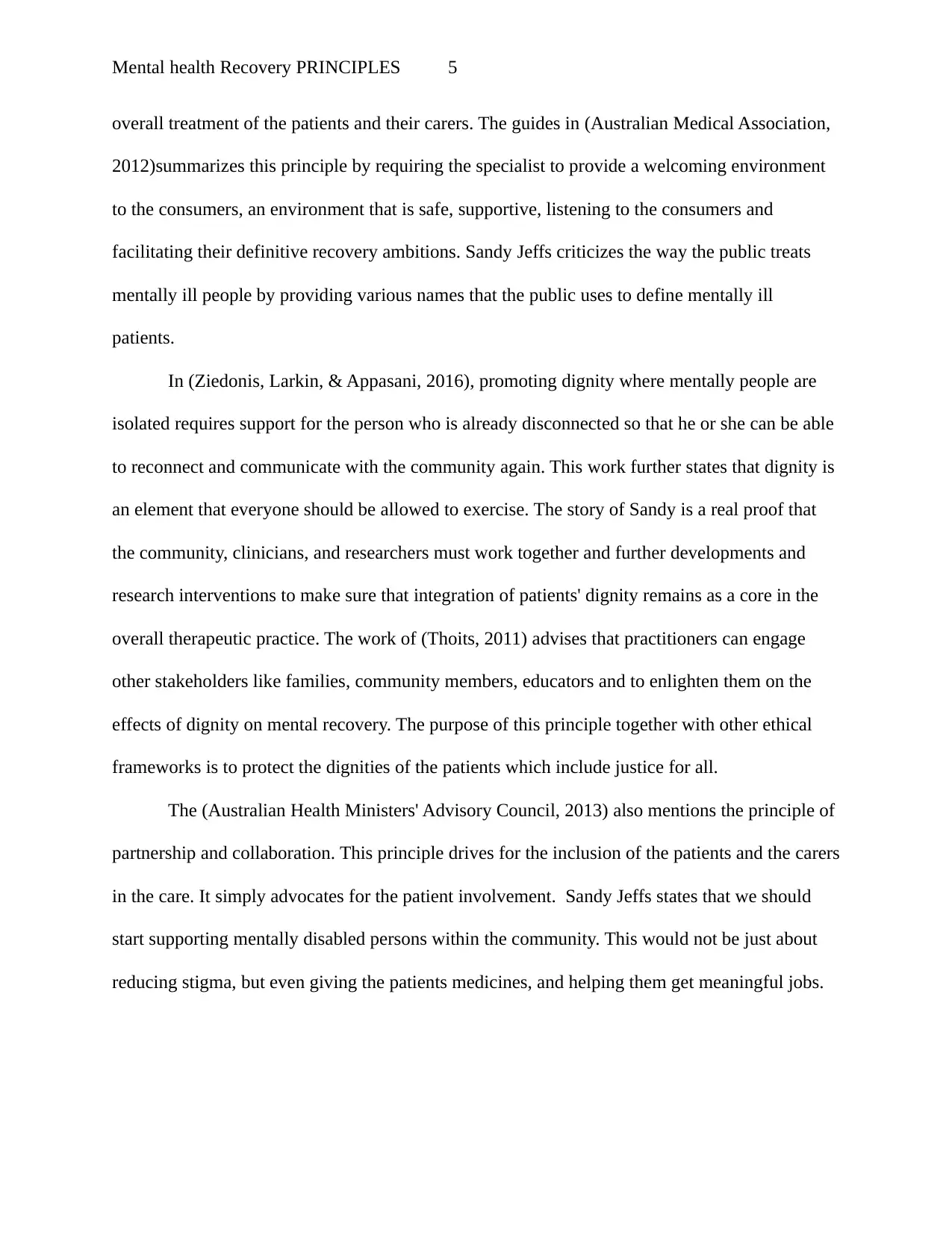
Mental health Recovery PRINCIPLES 5
overall treatment of the patients and their carers. The guides in (Australian Medical Association,
2012)summarizes this principle by requiring the specialist to provide a welcoming environment
to the consumers, an environment that is safe, supportive, listening to the consumers and
facilitating their definitive recovery ambitions. Sandy Jeffs criticizes the way the public treats
mentally ill people by providing various names that the public uses to define mentally ill
patients.
In (Ziedonis, Larkin, & Appasani, 2016), promoting dignity where mentally people are
isolated requires support for the person who is already disconnected so that he or she can be able
to reconnect and communicate with the community again. This work further states that dignity is
an element that everyone should be allowed to exercise. The story of Sandy is a real proof that
the community, clinicians, and researchers must work together and further developments and
research interventions to make sure that integration of patients' dignity remains as a core in the
overall therapeutic practice. The work of (Thoits, 2011) advises that practitioners can engage
other stakeholders like families, community members, educators and to enlighten them on the
effects of dignity on mental recovery. The purpose of this principle together with other ethical
frameworks is to protect the dignities of the patients which include justice for all.
The (Australian Health Ministers' Advisory Council, 2013) also mentions the principle of
partnership and collaboration. This principle drives for the inclusion of the patients and the carers
in the care. It simply advocates for the patient involvement. Sandy Jeffs states that we should
start supporting mentally disabled persons within the community. This would not be just about
reducing stigma, but even giving the patients medicines, and helping them get meaningful jobs.
overall treatment of the patients and their carers. The guides in (Australian Medical Association,
2012)summarizes this principle by requiring the specialist to provide a welcoming environment
to the consumers, an environment that is safe, supportive, listening to the consumers and
facilitating their definitive recovery ambitions. Sandy Jeffs criticizes the way the public treats
mentally ill people by providing various names that the public uses to define mentally ill
patients.
In (Ziedonis, Larkin, & Appasani, 2016), promoting dignity where mentally people are
isolated requires support for the person who is already disconnected so that he or she can be able
to reconnect and communicate with the community again. This work further states that dignity is
an element that everyone should be allowed to exercise. The story of Sandy is a real proof that
the community, clinicians, and researchers must work together and further developments and
research interventions to make sure that integration of patients' dignity remains as a core in the
overall therapeutic practice. The work of (Thoits, 2011) advises that practitioners can engage
other stakeholders like families, community members, educators and to enlighten them on the
effects of dignity on mental recovery. The purpose of this principle together with other ethical
frameworks is to protect the dignities of the patients which include justice for all.
The (Australian Health Ministers' Advisory Council, 2013) also mentions the principle of
partnership and collaboration. This principle drives for the inclusion of the patients and the carers
in the care. It simply advocates for the patient involvement. Sandy Jeffs states that we should
start supporting mentally disabled persons within the community. This would not be just about
reducing stigma, but even giving the patients medicines, and helping them get meaningful jobs.
⊘ This is a preview!⊘
Do you want full access?
Subscribe today to unlock all pages.

Trusted by 1+ million students worldwide
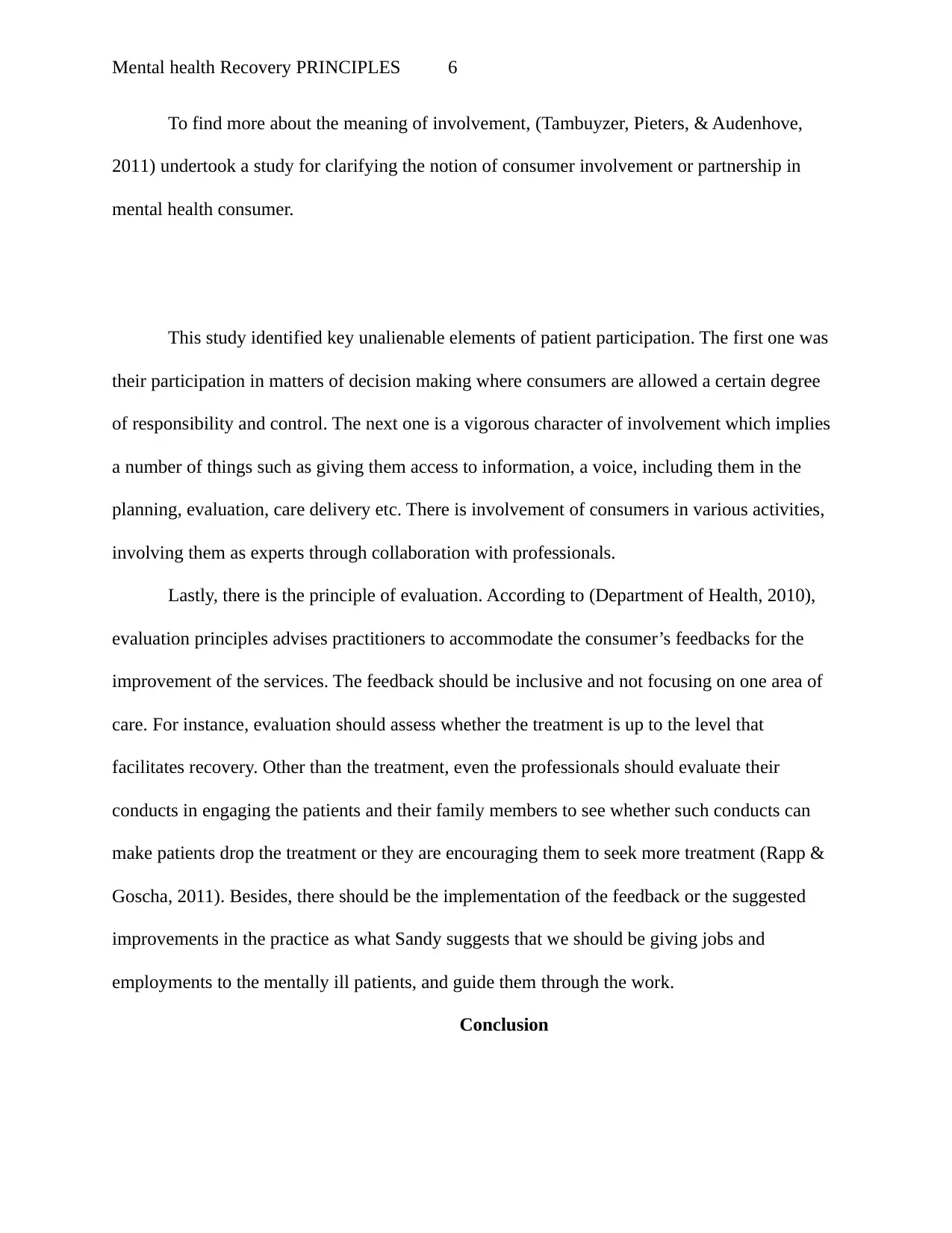
Mental health Recovery PRINCIPLES 6
To find more about the meaning of involvement, (Tambuyzer, Pieters, & Audenhove,
2011) undertook a study for clarifying the notion of consumer involvement or partnership in
mental health consumer.
This study identified key unalienable elements of patient participation. The first one was
their participation in matters of decision making where consumers are allowed a certain degree
of responsibility and control. The next one is a vigorous character of involvement which implies
a number of things such as giving them access to information, a voice, including them in the
planning, evaluation, care delivery etc. There is involvement of consumers in various activities,
involving them as experts through collaboration with professionals.
Lastly, there is the principle of evaluation. According to (Department of Health, 2010),
evaluation principles advises practitioners to accommodate the consumer’s feedbacks for the
improvement of the services. The feedback should be inclusive and not focusing on one area of
care. For instance, evaluation should assess whether the treatment is up to the level that
facilitates recovery. Other than the treatment, even the professionals should evaluate their
conducts in engaging the patients and their family members to see whether such conducts can
make patients drop the treatment or they are encouraging them to seek more treatment (Rapp &
Goscha, 2011). Besides, there should be the implementation of the feedback or the suggested
improvements in the practice as what Sandy suggests that we should be giving jobs and
employments to the mentally ill patients, and guide them through the work.
Conclusion
To find more about the meaning of involvement, (Tambuyzer, Pieters, & Audenhove,
2011) undertook a study for clarifying the notion of consumer involvement or partnership in
mental health consumer.
This study identified key unalienable elements of patient participation. The first one was
their participation in matters of decision making where consumers are allowed a certain degree
of responsibility and control. The next one is a vigorous character of involvement which implies
a number of things such as giving them access to information, a voice, including them in the
planning, evaluation, care delivery etc. There is involvement of consumers in various activities,
involving them as experts through collaboration with professionals.
Lastly, there is the principle of evaluation. According to (Department of Health, 2010),
evaluation principles advises practitioners to accommodate the consumer’s feedbacks for the
improvement of the services. The feedback should be inclusive and not focusing on one area of
care. For instance, evaluation should assess whether the treatment is up to the level that
facilitates recovery. Other than the treatment, even the professionals should evaluate their
conducts in engaging the patients and their family members to see whether such conducts can
make patients drop the treatment or they are encouraging them to seek more treatment (Rapp &
Goscha, 2011). Besides, there should be the implementation of the feedback or the suggested
improvements in the practice as what Sandy suggests that we should be giving jobs and
employments to the mentally ill patients, and guide them through the work.
Conclusion
Paraphrase This Document
Need a fresh take? Get an instant paraphrase of this document with our AI Paraphraser
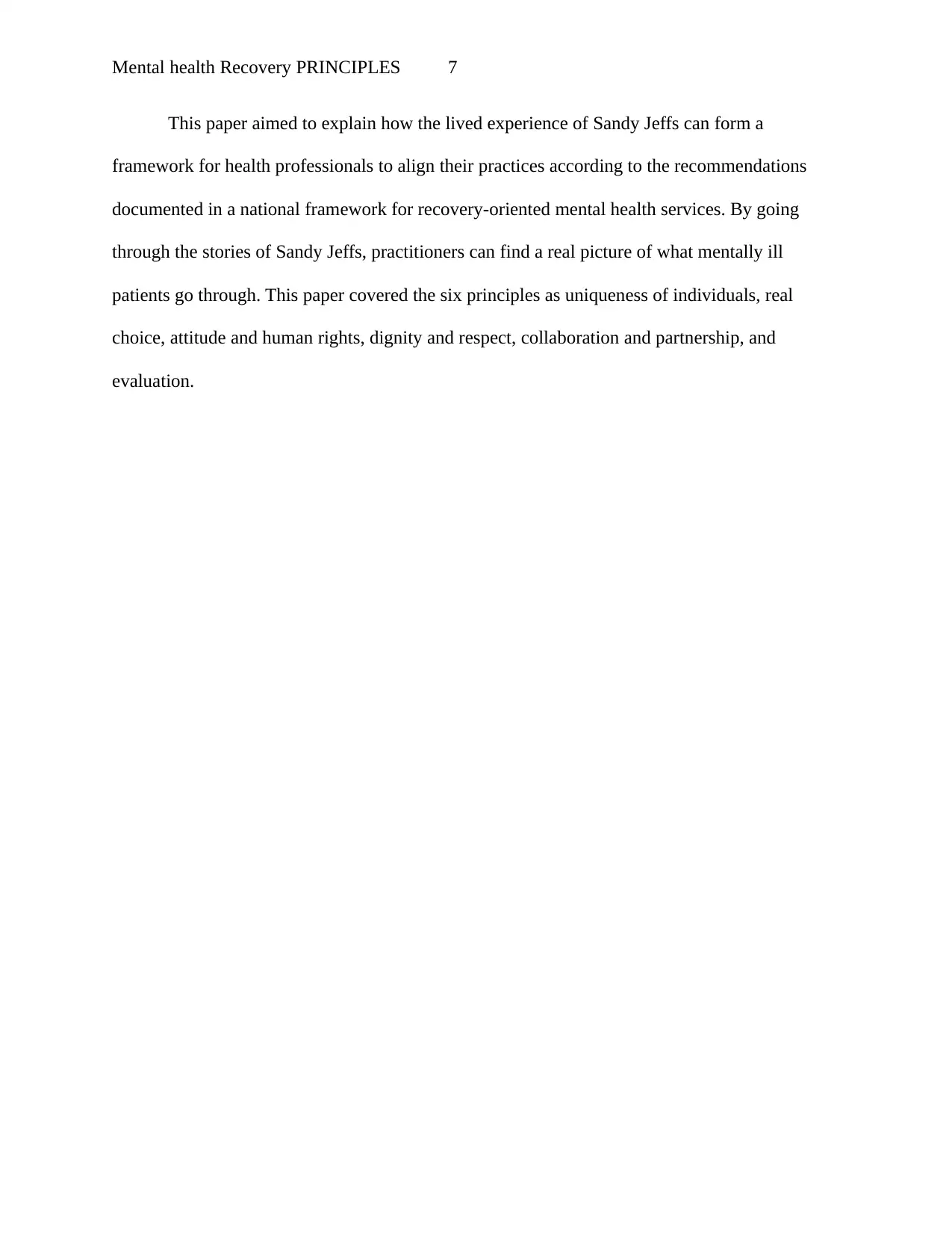
Mental health Recovery PRINCIPLES 7
This paper aimed to explain how the lived experience of Sandy Jeffs can form a
framework for health professionals to align their practices according to the recommendations
documented in a national framework for recovery-oriented mental health services. By going
through the stories of Sandy Jeffs, practitioners can find a real picture of what mentally ill
patients go through. This paper covered the six principles as uniqueness of individuals, real
choice, attitude and human rights, dignity and respect, collaboration and partnership, and
evaluation.
This paper aimed to explain how the lived experience of Sandy Jeffs can form a
framework for health professionals to align their practices according to the recommendations
documented in a national framework for recovery-oriented mental health services. By going
through the stories of Sandy Jeffs, practitioners can find a real picture of what mentally ill
patients go through. This paper covered the six principles as uniqueness of individuals, real
choice, attitude and human rights, dignity and respect, collaboration and partnership, and
evaluation.
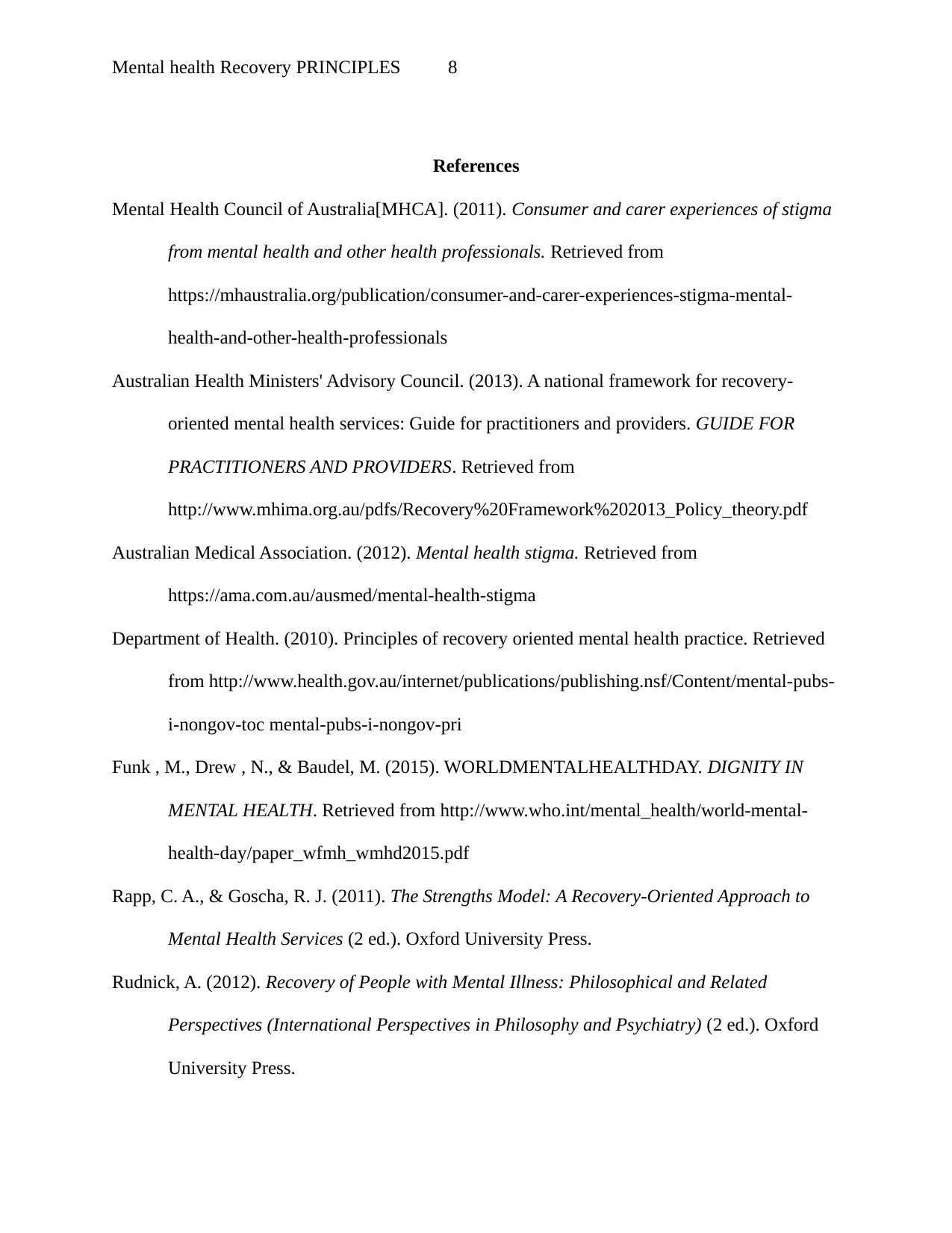
Mental health Recovery PRINCIPLES 8
References
Mental Health Council of Australia[MHCA]. (2011). Consumer and carer experiences of stigma
from mental health and other health professionals. Retrieved from
https://mhaustralia.org/publication/consumer-and-carer-experiences-stigma-mental-
health-and-other-health-professionals
Australian Health Ministers' Advisory Council. (2013). A national framework for recovery-
oriented mental health services: Guide for practitioners and providers. GUIDE FOR
PRACTITIONERS AND PROVIDERS. Retrieved from
http://www.mhima.org.au/pdfs/Recovery%20Framework%202013_Policy_theory.pdf
Australian Medical Association. (2012). Mental health stigma. Retrieved from
https://ama.com.au/ausmed/mental-health-stigma
Department of Health. (2010). Principles of recovery oriented mental health practice. Retrieved
from http://www.health.gov.au/internet/publications/publishing.nsf/Content/mental-pubs-
i-nongov-toc mental-pubs-i-nongov-pri
Funk , M., Drew , N., & Baudel, M. (2015). WORLDMENTALHEALTHDAY. DIGNITY IN
MENTAL HEALTH. Retrieved from http://www.who.int/mental_health/world-mental-
health-day/paper_wfmh_wmhd2015.pdf
Rapp, C. A., & Goscha, R. J. (2011). The Strengths Model: A Recovery-Oriented Approach to
Mental Health Services (2 ed.). Oxford University Press.
Rudnick, A. (2012). Recovery of People with Mental Illness: Philosophical and Related
Perspectives (International Perspectives in Philosophy and Psychiatry) (2 ed.). Oxford
University Press.
References
Mental Health Council of Australia[MHCA]. (2011). Consumer and carer experiences of stigma
from mental health and other health professionals. Retrieved from
https://mhaustralia.org/publication/consumer-and-carer-experiences-stigma-mental-
health-and-other-health-professionals
Australian Health Ministers' Advisory Council. (2013). A national framework for recovery-
oriented mental health services: Guide for practitioners and providers. GUIDE FOR
PRACTITIONERS AND PROVIDERS. Retrieved from
http://www.mhima.org.au/pdfs/Recovery%20Framework%202013_Policy_theory.pdf
Australian Medical Association. (2012). Mental health stigma. Retrieved from
https://ama.com.au/ausmed/mental-health-stigma
Department of Health. (2010). Principles of recovery oriented mental health practice. Retrieved
from http://www.health.gov.au/internet/publications/publishing.nsf/Content/mental-pubs-
i-nongov-toc mental-pubs-i-nongov-pri
Funk , M., Drew , N., & Baudel, M. (2015). WORLDMENTALHEALTHDAY. DIGNITY IN
MENTAL HEALTH. Retrieved from http://www.who.int/mental_health/world-mental-
health-day/paper_wfmh_wmhd2015.pdf
Rapp, C. A., & Goscha, R. J. (2011). The Strengths Model: A Recovery-Oriented Approach to
Mental Health Services (2 ed.). Oxford University Press.
Rudnick, A. (2012). Recovery of People with Mental Illness: Philosophical and Related
Perspectives (International Perspectives in Philosophy and Psychiatry) (2 ed.). Oxford
University Press.
⊘ This is a preview!⊘
Do you want full access?
Subscribe today to unlock all pages.

Trusted by 1+ million students worldwide
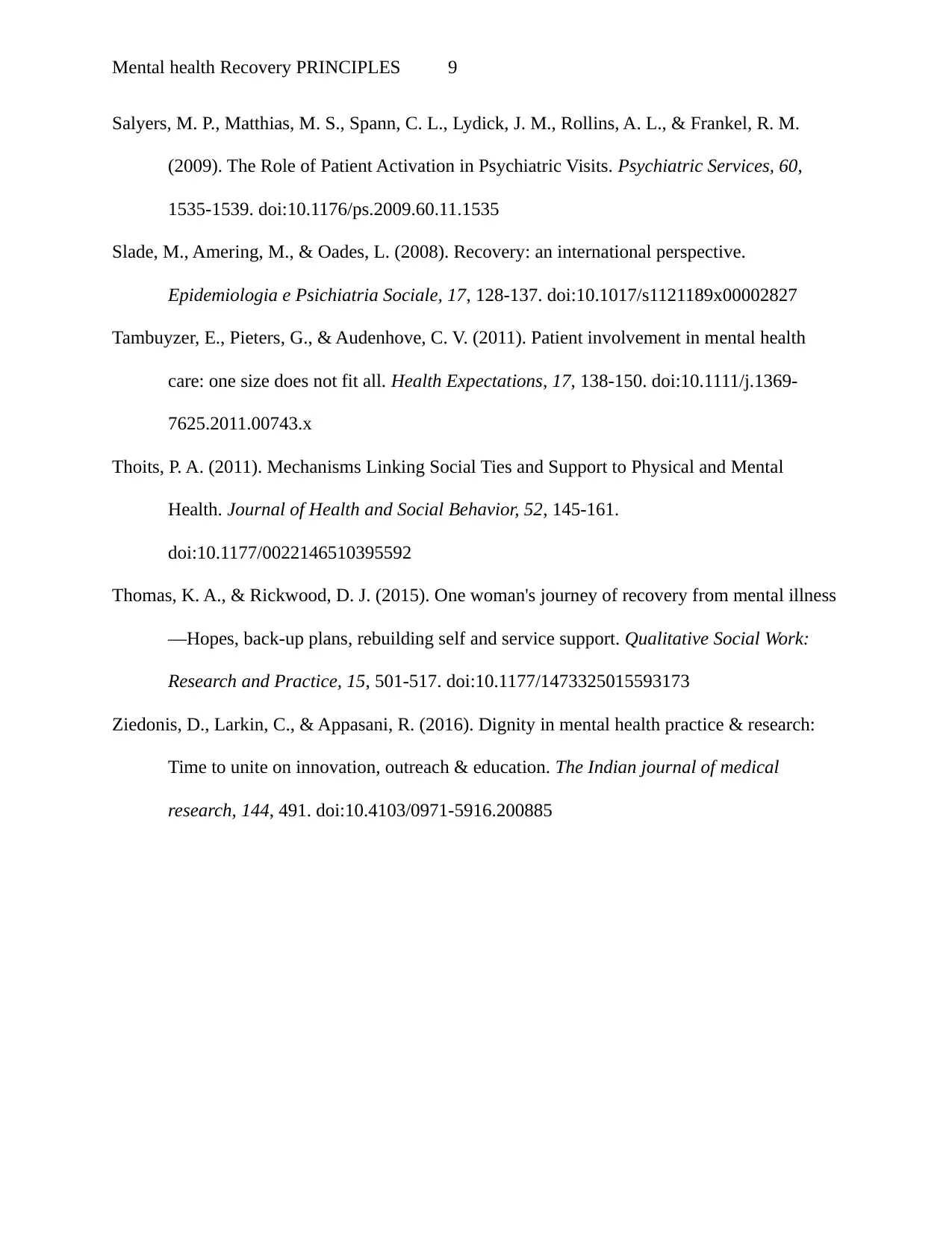
Mental health Recovery PRINCIPLES 9
Salyers, M. P., Matthias, M. S., Spann, C. L., Lydick, J. M., Rollins, A. L., & Frankel, R. M.
(2009). The Role of Patient Activation in Psychiatric Visits. Psychiatric Services, 60,
1535-1539. doi:10.1176/ps.2009.60.11.1535
Slade, M., Amering, M., & Oades, L. (2008). Recovery: an international perspective.
Epidemiologia e Psichiatria Sociale, 17, 128-137. doi:10.1017/s1121189x00002827
Tambuyzer, E., Pieters, G., & Audenhove, C. V. (2011). Patient involvement in mental health
care: one size does not fit all. Health Expectations, 17, 138-150. doi:10.1111/j.1369-
7625.2011.00743.x
Thoits, P. A. (2011). Mechanisms Linking Social Ties and Support to Physical and Mental
Health. Journal of Health and Social Behavior, 52, 145-161.
doi:10.1177/0022146510395592
Thomas, K. A., & Rickwood, D. J. (2015). One woman's journey of recovery from mental illness
—Hopes, back-up plans, rebuilding self and service support. Qualitative Social Work:
Research and Practice, 15, 501-517. doi:10.1177/1473325015593173
Ziedonis, D., Larkin, C., & Appasani, R. (2016). Dignity in mental health practice & research:
Time to unite on innovation, outreach & education. The Indian journal of medical
research, 144, 491. doi:10.4103/0971-5916.200885
Salyers, M. P., Matthias, M. S., Spann, C. L., Lydick, J. M., Rollins, A. L., & Frankel, R. M.
(2009). The Role of Patient Activation in Psychiatric Visits. Psychiatric Services, 60,
1535-1539. doi:10.1176/ps.2009.60.11.1535
Slade, M., Amering, M., & Oades, L. (2008). Recovery: an international perspective.
Epidemiologia e Psichiatria Sociale, 17, 128-137. doi:10.1017/s1121189x00002827
Tambuyzer, E., Pieters, G., & Audenhove, C. V. (2011). Patient involvement in mental health
care: one size does not fit all. Health Expectations, 17, 138-150. doi:10.1111/j.1369-
7625.2011.00743.x
Thoits, P. A. (2011). Mechanisms Linking Social Ties and Support to Physical and Mental
Health. Journal of Health and Social Behavior, 52, 145-161.
doi:10.1177/0022146510395592
Thomas, K. A., & Rickwood, D. J. (2015). One woman's journey of recovery from mental illness
—Hopes, back-up plans, rebuilding self and service support. Qualitative Social Work:
Research and Practice, 15, 501-517. doi:10.1177/1473325015593173
Ziedonis, D., Larkin, C., & Appasani, R. (2016). Dignity in mental health practice & research:
Time to unite on innovation, outreach & education. The Indian journal of medical
research, 144, 491. doi:10.4103/0971-5916.200885
1 out of 10
Related Documents
Your All-in-One AI-Powered Toolkit for Academic Success.
+13062052269
info@desklib.com
Available 24*7 on WhatsApp / Email
![[object Object]](/_next/static/media/star-bottom.7253800d.svg)
Unlock your academic potential
Copyright © 2020–2025 A2Z Services. All Rights Reserved. Developed and managed by ZUCOL.





